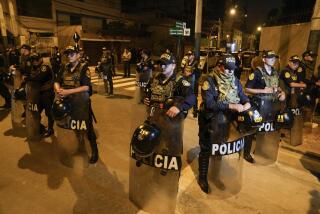Rebels Release 38 Hostages in Peru Standoff
- Share via
LIMA, Peru — Left-wing rebels who have taken over the Japanese ambassador’s residence here released 38 hostages on Friday but demanded that the Peruvian government make concessions before the guerrillas free any more of their hundreds of VIP prisoners.
The freed captives, including several foreign ambassadors, Peruvian politicians, academics and Boy Scout leaders, emerged smiling and waving from the compound where they had been held since Tuesday.
But they assailed the Peruvian government for cutting off the building’s water, electricity and telephones. And, in what appeared to be a public relations coup for the guerrillas, the prestigious captives demanded wide-ranging peace talks between authorities and the rebels.
About 340 hostages remained in the Japanese ambassador’s residence, seized in a spectacular raid by Tupac Amaru Revolutionary Movement guerrillas on a swank party Tuesday in honor of the birthday of Akihito, the emperor of Japan.
Among those released late Friday were the ambassadors of Brazil, Egypt and South Korea. Six American diplomats are believed to be in the compound; none of them was freed.
“We find ourselves in an extremely difficult and delicate situation whose peaceful solution is complicated but indispensable,” said released Peruvian Congress member Javier Diez Canseco. He was reading in a hoarse voice a communique from Peruvian politicians, government officials and diplomats--some free and others still in captivity.
Bathed in TV lights near the Japanese ambassador’s residence, he warned that a military attack “not only would cost many lives, but would leave deeper wounds” in Peruvian society. Such an assault, he added, would also eliminate the opportunity for a “wide-ranging solution” to the problem of the guerrillas.
It was a remarkable statement about a rebel group that, until recently, was a marginal element in Peruvian society. Peru has faced far greater violence from the radical Sendero Luminoso, or Shining Path, guerrillas.
Diez Canseco went on to read a demand by the rebels to talk by telephone with fellow guerrillas imprisoned in Peruvian jails to determine the state of their health.
If they can have such phone communications, the rebels promised to “free a significant number of people who are detained” in the Japanese ambassador’s residence.
*
Peru’s president, Alberto Fujimori, indicated to Peruvian newspaper editors in a private meeting that he would not cede to rebel demands.
Japanese and other world governments have appealed to Fujimori to seek a negotiated solution that will spare the hostages, and he has indicated in a letter that the hostages’ lives and safety are a paramount concern. But Fujimori also considers one of the hallmarks of his presidency to be the crippling of left-wing rebel movements in Peru in recent years.
Manuel d’Ornellas, editor of the Lima daily Expreso, said the president indicated in the meeting that he would not meet the rebels’ demand for freedom for about 300 of their jailed comrades.
And the president scorned a Lima newspaper’s report Friday that one of the negotiators would be allowed to hold talks with an imprisoned rebel leader.
But Fujimori declined to give any idea how the crisis might be solved, D’Ornellas said.
“I think it’s such a fluid situation, he really doesn’t know himself,” the editor said.
“He was very cautious, he was in very good spirits, very much in control of the situation. He seemed to be very confident things will end up well,” D’Ornellas said.
Fujimori so far has declined offers of assistance from foreign governments, including the United States, which has flown a special anti-terrorism team coordinated by the FBI to Peru, officials said.
Meanwhile, as the negotiations dragged on, conditions in the sprawling, white-columned Japanese ambassador’s residence have deteriorated, officials said.
Starting Friday morning, hostages held a series of hand-lettered signs to a window, appealing for food and water and a resumption of telephone, water and electrical service, which had been cut off.
“No food. No water. The hostages,” read one of the signs, which appeared in Spanish, English, German and Japanese. Another asked for a crew from the Japanese TV company NHK to enter the building, although that did not happen.
Red Cross officials supervised delivery to the besieged building of dozens of large plastic containers of bottled water Friday, as well as apples, chicken, medicine and toilet paper. The officials shuttled out handwritten messages from the hostages to their families.
The rebels also allowed 16 portable toilets to be installed in the compound, said Canadian Ambassador Anthony Vincent, who was assisting in the negotiations.
More to Read
Sign up for Essential California
The most important California stories and recommendations in your inbox every morning.
You may occasionally receive promotional content from the Los Angeles Times.













